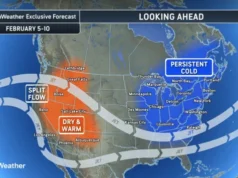
By
Jump to:
- Heat waves
- Heavy rainfall and flash floods
- Hurricanes, typhoons and cyclones
- Wildfires
- Air turbulence
- All hope is not lost
- What you can do to help
Severe turbulence, record rainfall, killer heatwaves and raging wildfires to name but a few: is it just me, or is “Is Earth’s weather getting weirder?” The answer? Yes. Well, sort of.
These weather events have happened in the past, but the problem is nowadays they’re happening more frequently and to a far greater extent.
What’s causing this uptick in “global weirding” and is there anything we can do about it? Space.com spoke with a leading climate scientist Katharine Hayhoe to learn more about this strange surge in weird weather events and what it means for us.
“Each of us, wherever we live, are experiencing the impacts of climate change today,” climate scientist Katharine Hayhoe told Space.com in an interview.
Some of us might not even be aware of the impacts climate change is having on our everyday lives. From how more extreme weather events are causing home insurance rates to rise, or how our food is becoming less nutritious and drinking water more scarce, whether we like it or not, we are all affected by climate change.
Katharine Hayhoe is an atmospheric scientist with a primary focus on climate change. Hayhoe is the Chief Scientist for the global conservation organization The Nature Conservancy. Hayhoe is also a Paul Whitfield Horn Distinguished Professor and the Political Science Endowed Chair in Public Policy and Public Law in the Department of Political Science and a principal investigator for the Department of Interior’s South-Central Climate Adaptation Science Center and the National Science Foundation’s Global Infrastructure Climate Network.
One significant direct effect of climate change is the upturn of extreme weather events that put lives at risk and have a huge economic impact. Extreme weather events attributable to climate change cost the world $143 billion USD per year, the majority of which (63%) is due to the loss of human lives, according to a research paper published in the Journal Nature in 2023.
But just how is Earth’s weather getting weirder?
Disclaimer
The information contained in South Florida Reporter is for general information purposes only.
The South Florida Reporter assumes no responsibility for errors or omissions in the contents of the Service.
In no event shall the South Florida Reporter be liable for any special, direct, indirect, consequential, or incidental damages or any damages whatsoever, whether in an action of contract, negligence or other tort, arising out of or in connection with the use of the Service or the contents of the Service.
The Company reserves the right to make additions, deletions, or modifications to the contents of the Service at any time without prior notice.
The Company does not warrant that the Service is free of viruses or other harmful components












